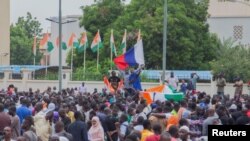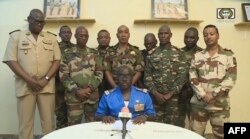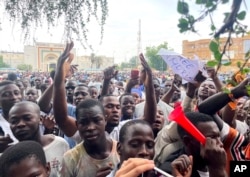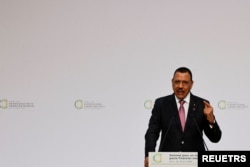But analysts say because President Mohamed Bazoum comes from a minority group within Niger and was elected on a platform of pursuing many reforms, he may have encountered resistance from the more dominant ethnic groups.
In their address to the nation, the head of the mutiny, Colonel Amadou Abdramane, said that defense and security forces toppled the government due to bad governance and to the security situation in Niger. On Thursday, all activities by political parties in the country had been suspended until further notice, Abdramane said on state television.
Abdourahmane Alkassoum, a political and security analyst who focuses on the Sahel, told VOA from Niger things still seem confusing in the capital, Niamey, a day after the military takeover was announced.
“The downtown is being evacuated at the moment for fears of I don’t know what... We are in a confusing situation, where on one hand, there are indications the coup was successful while on the other hand, others said it hasn’t," he said.
Democratically elected President Mohamed Bazoum took the oath of office in April 2021. Dr. Edgar Githua, an international relations and diplomacy expert teaching at the U.S. International University in Nairobi, told VOA the latest political unrest was not unexpected.
“This is a country that has endured four coups in its history ... so the political culture in Niger is that the military feels very entitled or have been enabled to feel that they really need to play a role in politics,” Githua said.
Githua says President Bazoum’s ethnic background could be another possible reason.
“He’s a Diffa Arab, and he came from a minority group ... he came in and he was making lots of changes because he inherited a country that had bigger ethnic groups ... we are talking about the Hausas, the Zamas, the Tuaregs, ... and normally what happens for such presidents who inherit constituencies where they come from a minority, ... they feel like they are under siege ... because ... you are in the minority and the other people who control government are from other ethnic groups who believe or do not feel, you deserve to lead them,” said Githua.
The West African economic bloc ECOWAS, the African Union and others in the international community have condemned the events in Niger and have called on the president to be freed immediately.
In a region that has recently seen a wave of coups in Mali, Burkina Faso and Guinea, Niger has been able to hold on to democratic stability since Bazoum came to power. Alkassoum says this coup attempt, if successful, could affect the whole region.
“If Niger falls, it’s all ECOWAS that falls, and all the Sahel that falls, and if we are not careful the same way the other countries with military dictatorships have fallen into total insecurity, that’s not excluded [for us],” said Alkassoum.
Niger, located in the Sahel region, has been battling Islamist militants and France, which has been helping in that fight, has about 1,500 soldiers there.
Githua says he does not think this coup attempt will stick.
“The European Union, the US and France will not let Niger go down. ... This is their bastion of hope in the region in containing the excessive incursions, rebellions, terrorism and al Qaeda activities in that region, Boko haram and the likes. ...The U.S. already has troops stationed in Niger; they are special forces, around 1,000, France has quite a number," said Githua. "They will rally around the people.”
Bazoum supporters on Wednesday gathered in front of the National Assembly building to call for his release. But on Thursday, others demonstrated in favor of the putschists.



